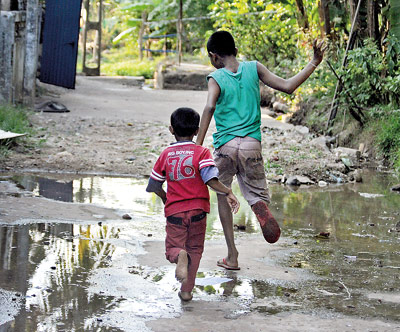News
Garbage collection and recycling in the dumps
Recycling household waste material collected by local councils is running into various problems due to poor planning, improper collection mechanisms and lack of public cooperation, the Sunday Time learns.

Environment hazard: Children play besides washed away garbage pile on the road. Pic by Amila Gamage
The Central Environmental Authority (CEA) gives financial and technical support to more than 125 local authorities to implement the recycling programme.
One of the main problems is that recyclable items are not separated properly at the household level, the Sunday Times learns.CEA’s Waste Management Director Ajith Weerasundara said local authorities are responsible for garbage collection countrywide, but added that until waste matter is properly separated the councils are unable to meet the targets.
“Today, homes that are barely five miles apart have totally different ways of collecting or separating waste materials. This confuses the garbage collectors and frustrate attempts to improve garbage collection and recycling process,” he said.
According to statistics, paper has declined to 22 percent of the overall waste stream, while plastic, notoriously expensive to recycle, has increased to 27 percent.
Residents complain that local councils give them conflicting and confusing instructions regarding the sorting out of household waste.
“We were told bio degradable food items should be collected separately and paper and cardboard in a different bin, but the garbage collectors dump everything together in the tractors.
There is no logic in the advice given to us,” Vidharshana Pathirana, a resident from Nayakakanda, Hendala complained.
“We just waste time and energy taking the trouble to separate them,” he said.
The public charge that failure by local councils to implement effective garbage collection systems and recycling methods has resulted in tons of garbage being piled up at dumping sites.
One such is the Karadiyana site in Piliyandala.
The villagers in surrounding areas have held several protests the latest being last Sunday. They charge that the recycling programme at the site is not being implemented properly and complaints to the Western Provincial Council have gone unheard.
The issue is not confined to the Western Province alone. A recycling programme run by the Ella Pradeshiya Sabha too has run into similar problems.

“A recycling programme was launched in the area by the authorities, but it has failed and the stench is unbearable. Unfortunately the dump site was beside the main road off Ella town which is a popular tourist destinations,” hotel owner Wasantha Kithsiri complained.
Meanwhile Environmental Police ASP B.W.W Rajapakse, said people were compelled to dump their garbage on the roads, because the local councils were not doing their job properly.
Most of the decomposing waste is given to private companies to be turned into compost, he said, adding that in many areas residents have been told to separate recyclable waste from the non recyclable.
However, this has caused problems, with garbage collectors refusing to take the refuse if residents have not separated their garbage, he said.
“To be fair, if the recycling industry’s problems were confined to shrinking volumes of recyclables, it probably wouldn’t be facing a crisis. The bigger problem is the expansion of recyclables that are made of difficult-to-sort- out materials,” the ASP said.
Kaduwela Municipal Council’s Development Officer Lalith Nanayakkara said the main snags were lack of knowledge about recycling, technical and financial shortcomings.
A majority of the recycling plants complain that the waste delivered by the councils is of bad quality and not separated correctly.
The collection is then rejected and sent to landfill sites. They also cited rising labour costs for the failure of recycling programmes.
However a Public Health Inspector (PHI) in Kadawatha, said the Council had strictly implemented the rule that residents separate their waste, but after the compost yard’s refusal to accept the garbage, all the garbage is mixed together when collected.
“We are trying to promote the seven steps of waste management– managing the waste at the place of origin, taking the garbage from the places of origin, cleaning up of public places, stopping the usage of open garbage bins, streamlining garbage transportation, using garbage as a resource and streamlining the garbage dumping sites,” he said.
The lack of organised recycling programmes is dampening the enthusiasm among sections of the public who are keen to work towards a clean environment, many residents told the Sunday Times.

